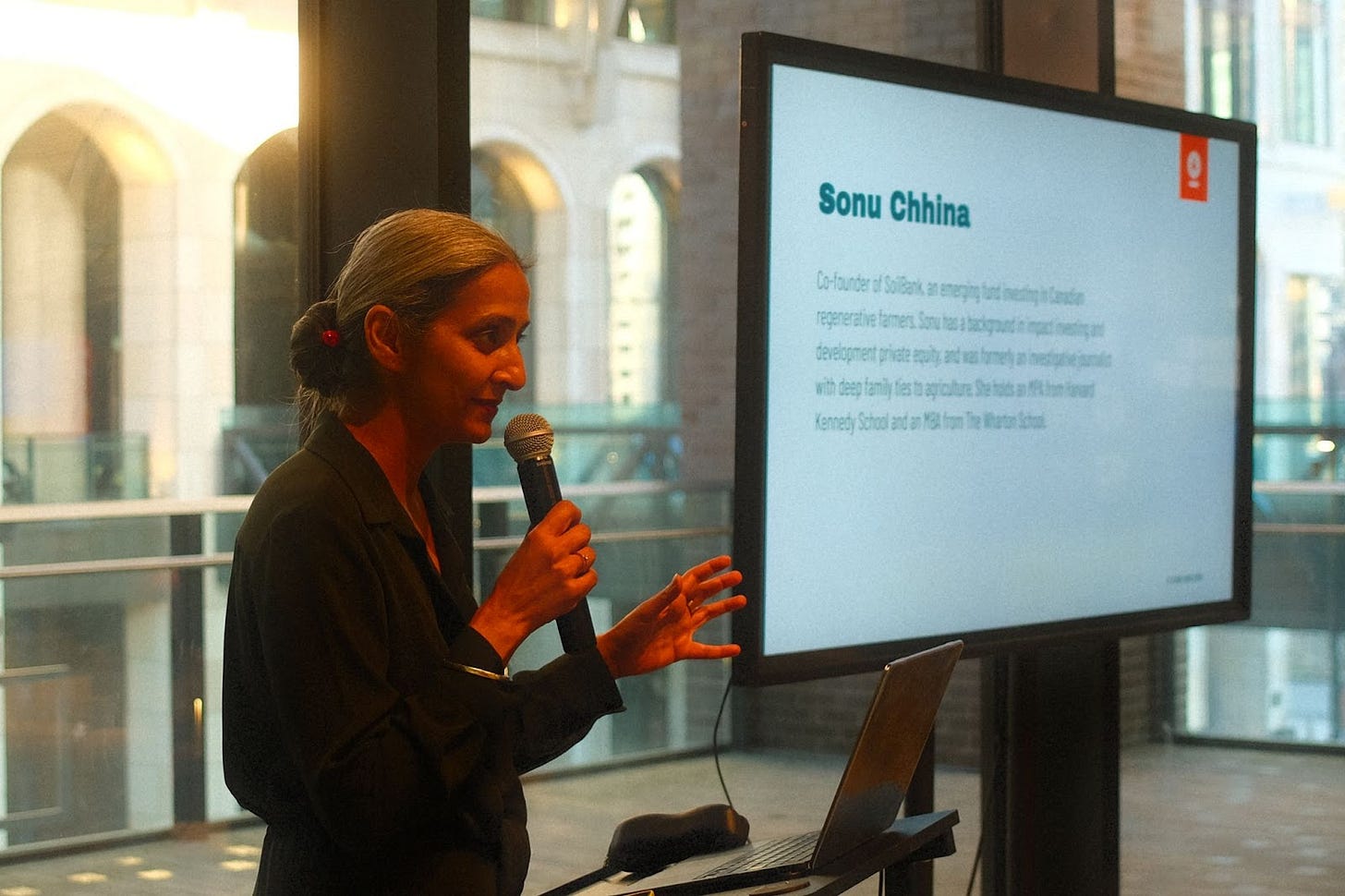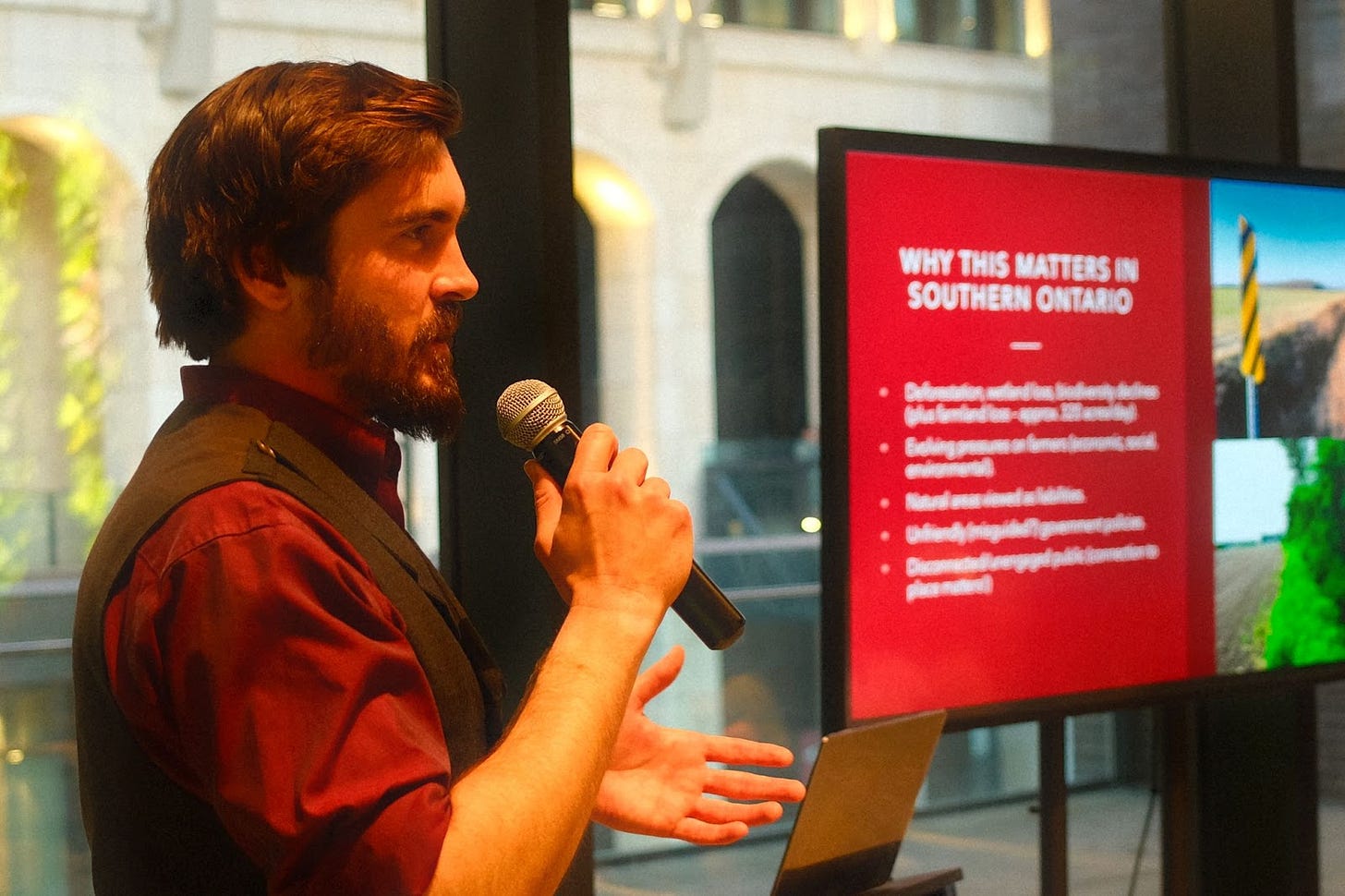Earth Day 2025: From the Ground Up – Regenerating Profit & Planet
An Earth Day journey through regenerative agriculture, immersive art, and community connection.

How’s it going, Climate Northerners?! 🌿
Over here at Climate North, every day feels like Earth Day — but on April 22nd, we dialed it up a notch. We figured, what better way to celebrate our extraordinary planet (and our stellar community) than by embarking on an immersive and educational adventure? We wanted to explore how we can restore the Earth, starting from the ground up.
We’ve collaborated with our friends over at Arcadia Earth before and this second time around was just as special, if not more. Major thanks to them for hosting us in their vibrant downtown Toronto space and to Animal Liberation Kitchen for keeping us fueled with a delicious vegan spread.
Staying true to the name of the event, “from the ground up”, the night focused on digging into the world of regenerative agriculture. We learned about the impact of healthy soils on our health and planet, along with the real-world challenges farmers regularly face.
We were transported underwater through Arcadia Earth’s exhibit: a multi-sensory journey across the planet featuring large scale art installations, along with experiencing exciting virtual and augmented reality tech. Virtually gliding alongside sea turtles 🐢 and jellyfish, we learned that coral reefs, home to over 25% of marine life, are rapidly disappearing due to warming waters and pollution.
By blending immersive art and interactive technology, these installations showcased both the beauty of the planet 🌍 coupled with the harsh reality of the impacts of human behaviour. The experience was a vivid call to cherish and protect the fragile beauty of our Earth.
Oh and incase you didn’t hear the buzz, Toronto Climate Week is launching! A citywide celebration bringing together communities, ideas, decision makers, and climate solutions.
Keep reading for more details and how you can get involved!
👩🏫 WHO DID WE HEAR FROM?
Founder of Wastenot Farms Inc. and and creator of Jocelyn's Soil Booster, she has over a decade of experience in waste management and regenerative systems with a passion in practical, high-impact environmental solutions.
Co-founder of SoilBank, an emerging fund investing in Canadian regenerative farmers, she has a background in impact investing and development private equity and has deep family ties to agriculture.
Matt is a farmer and award winning freelance journalist. Under the brand The Rural PhilosoFer, he explores environment, food systems, and policy with a systems thinking lens.
🎤KEY INSIGHTS: WHAT WE LEARNED
🧑🌾 Reviving the Earth: The Power of Soil Biology
Regenerative Agriculture: Regenerative agriculture describes holistic farming systems that, among other benefits, improve water and air quality, enhance ecosystem biodiversity, produce nutrient-dense food, and store carbon to help mitigate the effects of climate change.
Core Idea:
Nature inherently holds the wisdom needed to heal our environmental and agricultural systems — by restoring the natural biology of the soil through regenerative practices, we can heal our climate, produce healthier food, and build a more sustainable future.
Why It Matters:
Modern chemical agriculture is degrading both our soil and our food as it negatively affects the soil biology and our microbiomes. By returning to and restoring the soil’s natural biology, we have the opportunity to create lasting positive change.
What to Know:
Plants sequester carbon into soil🌳 through photosynthesis, in turn, feeding microbes.
Microbes create healthy soil structure, and help plants grow stronger by facilitating nutrient exchange.
Other Takeaways:
Closed-Loop Bio-Refinery systems transform organic waste into new products in a sustainable cycle. An example of this system was shared by Jocelyn on how she is using food waste from local businesses, which are processed by millions of worms at her vermicomposting farm, creating the output of a high concentrated soil booster.
The Soil Food Web speaks to thriving underground ecosystems as essential to holding carbon in the soil and supporting plant health through biological nutrient exchanges.
Nature has the answers, techniques like vermicomposting, crop rotation, and biological soil management offer practical, scalable solutions.

🌱💰Rooting for Change: Financing the Future of Regenerative Farming
Core Idea:
Regenerative farming can help heal the planet — but it needs to make financial sense for farmers, who are already working with razor thin margins. With the right support, healthy soil can mean healthy profits, food, and climate.
Why It Matters:
Canada’s farmland is seeing a major drop in the amount of organic carbon found in its soil. This weakens its resilience to worsening weather events by reducing its ability to absorb water, ultimately threatening the long-term stability of Canada’s food systems. Not to mention the billions of dollars in loss that equates to annually 💸
Key Takeaways:
Regenerative Agriculture Principles focus on minimizing tillage to protect microbial life, planting cover crops to enhance soil structure, and rotating diverse crops for enhanced resilience and balance of nutrients.
There’s a huge opportunity for regenerative agriculture - as 10% of Canada’s emissions come from agriculture — to not only increase carbon sequestration, but also improve water quality💧, nutrient density, biodiversity, and yield resilience 🥒
These regenerative practices offer one of the lower cost climate solutions available.
The challenge? There are many. Whether it’s financial, technical assistance, market access, or policy and structural barriers, many components confront farmers looking to adopt these practices.
Soil Bank seeks to combat these hurdles through investing in farmers that are investing in soil health.

🚜Rooted in Reality: Navigating the Bumpy Road to Regenerative Farming
Core Idea:
Regenerative agriculture sounds simple — just farm with nature, right? In reality, it’s complicated, full of risks, and needs real strategy, time, and investment. Farmers want to rebuild ecosystems and stay afloat financially — but they need better support, smarter ongoing policies, and more patience from the community.
Why It Matters:
Every day in Ontario, we lose 320 acres of farmland (that’s the size of 180+ football fields 🏈) — and with it, the chance to restore ecosystems and grow resilient, local food.
Considering the farmland available, it’s even more important to focus on soil health and regenerative practices (like cover cropping and no-till) — but farmers need real incentives, long-term support, and acknowledgment that real change can be slow, complex, and risky.
By deepening our understanding of farming's complexity, the better we can shape policies, invest wisely, and champion the people growing our future.
Key Takeaways:
Farming Isn’t Simple. At its core, it’s about producing something new within a very complex system. Not tricky enough? - then throw in the added complexity of weather, economics, politics, and social issues to boot!
Risk is Real. Farmers already are navigating tight margins and transitioning to regenerative agriculture comes with financial risk. Farmers can't always just "try it and see" - security also needs to be prioritized.
No One-Size-Fits-All. Every farm is different - practices need to fit each farm's specific soil, ownership structures, weather, and goals.
Bring your Curiosity. Be mindful of seemingly simple solutions. Change starts with asking better questions, staying open-minded, and engaging with farmers in real, respectful ways

📸 A SNAPSHOT OF THE NIGHT
As aways, our highly requested photo album of the night can be found here.
Thanks Christopher Yam for capturing the vibrancy of the night.
“What stood out was the importance of soil. Especially living in the city, it was great to understand the impact of healthier soil on our food systems and relation to carbon. Don’t underestimate the power of soil!” - Climate North Guest
🤝UPCOMING EVENTS & EXCLUSIVE OFFERS
►Arcadia Earth
Arcadia Earth is Toronto’s most unique immersive experience– a multi-sensory journey through planet Earth. The immersive exhibit combines large-scale art installations and exciting technology, including virtual and augmented reality, allowing visitors to experience our breathtaking planet like never before! Visit Arcadia Earth today and get inspired to take action towards a more sustainable future.
Use Promo Code : NORTH15 for a discount of 15% off Regular Tickets until June 30th, 2025
►Jocelyn’s Soil Booster
Feed your soil, fuel your family, fight climate change. The Soil Booster products supply natural microbes to kickstart the soil’s living ecosystem, delivering on-demand nutrition so that plants flourish all season long.
Use Promo Code : climatenorth to save 20% off of regenerative growing products at SoilBooster.ca
►Toronto Climate Week
Something BIG is coming to Toronto!! 🌎💚
If you want to be part of the first ever Toronto Climate Week, whether it’s hosting an event, speaking, sponsoring, or volunteering, please reach out via the following:
✅ Submit a form at www.tocw.ca
✅ Follow us and help us grow:
⭐️ COMMUNITY SURVEY
Want a chance to win a $25 Patagonia gift card?
We’re looking ahead and exploring ways to help our community stay connected and engaged beyond our monthly events! Your insights are invaluable in shaping these efforts and will help us create more value for you.
Please take a few minutes to share your thoughts in this quick survey. You’ll be entered into a draw to win the prize.
🐳 YOUR TURN
Know someone passionate about climate but not yet connected with Climate North?
Share this newsletter with them and invite them to our next event! Keep up to speed on everything thats happening through our LinkedIn and Luma pages.
Stay tuned for our Carbon Literacy event on May 26th!
Written by Kathryn Weber. Edited by Chloe D'Agostini.
The Climate North Team 💚





